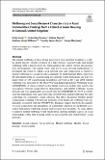Wellbeing and social network characteristics in rural communities : findings from a cohort in social housing in Cornwall, United Kingdom
Abstract
Background: The mental wellbeing of those living in resource poor and rural localities is a public health priority. Despite evidence of a link between social networks and mental wellbeing, little is known about this relationship in the context of rural and resource poor environments. The current study uses novel social network methodology to investigate the extent to which social network size and composition is related to mental wellbeing in a social housing community in rural England. Methods: Data come from 88 individuals living in social housing in Cornwall. These participants are part of a larger study of 329 social housing households surveyed in 2017 and 2018. Mental wellbeing was measured by the Short Warwick-Edinburgh Mental Wellbeing Scale (SWEMWBS). A series of multivariable linear regression models were used to test associations between social network characteristics and mental wellbeing. Results: Social network size was significantly associated with the SWEMWBS (b = 0.39, p < 0.01), such that individuals with larger networks reported better mental wellbeing, but after controlling for community social cohesion, this effect dissipated. Neither gender composition or talking with network members about health and wellbeing were significantly associated with the SWEMWBS. Conclusions: Findings suggest that both the quantity of social connections and perceptions of community cohesion are moderately associated with mental wellbeing in rural and resource poor localities. As such, efforts to improve mental wellbeing would benefit from targeting multiple aspects of social relationships, rather than focusing solely on increasing the size of individuals’ social networks.
Citation
Long , E , Stevens , S , Topciu , R , Williams , A J , Taylor , T & Morrissey , K 2022 , ' Wellbeing and social network characteristics in rural communities : findings from a cohort in social housing in Cornwall, United Kingdom ' , International Journal of Community Well-Being , vol. First Online . https://doi.org/10.1007/s42413-022-00167-5
Publication
International Journal of Community Well-Being
Status
Peer reviewed
ISSN
2524-5309Type
Journal article
Rights
Copyright © The Author(s) 2022. This article is licensed under a Creative Commons Attribution 4.0 International License, which permits use, sharing, adaptation, distribution and reproduction in any medium or format, as long as you give appropriate credit to the original author(s) and the source, provide a link to the Creative Commons licence, and indicate if changes were made. The images or other third party material in this article are included in the article’s Creative Commons licence, unless indicated otherwise in a credit line to the material. If material is not included in the article’s Creative Commons licence and your intended use is not permitted by statutory regulation or exceeds the permitted use, you will need to obtain permission directly from the copyright holder. To view a copy of this licence, visit http://creativecommons.org/licenses/by/4.0/.
Description
Funding: The Smartline project (www.smartline.org.uk, based in Cornwall, UK) received £6,930,810 of funding from the England European Regional Development Fund (Grant Numbers 05R16P00305, 05R18P02819) as part of the European Structural and Investment Funds Growth Programme 2014-2020. The Smartline project is also funded by the South West Academic Health Science Network, Cornwall Council, and Her Majesty (HM) Government, and is a partnership between University of Exeter, Coastline Housing, Volunteer Cornwall, Cornwall Council, and the South West Academic Health Science Network.Collections
Items in the St Andrews Research Repository are protected by copyright, with all rights reserved, unless otherwise indicated.
Related items
Showing items related by title, author, creator and subject.
-
Strength in a weakened state : interpreting Hizb’allah’s experiences as a social movement and governing coalition in Lebanon 1985-2013
Bernhoff, Arthur (University of St Andrews, 2015-06-23) - ThesisThis study investigates Hizb’allah’s successful but competing dual development as an extra-institutional Shi’a social movement and an institutional political party. Hizb’allah has traditionally been studied from the ... -
Radical social innovations and the spatialities of grassroots activism : navigating pathways for tackling inequality and reinventing the commons
Apostolopoulou, Elia; Bormpoudakis, Dimitrios; Chatzipavlidis, Alexandros; Cortés Vázquez, Juan José; Florea, Ioana; Gearey, Mary; Levy, Julyan; Loginova, Julia; Ordner, James; Partridge, Tristan; Pizarro Choy, Alejandra; Rhoades, Hannibal; Symons, Kate; Veríssimo, Céline; Wahby, Noura (2022-04-05) - Journal articleIn this article, by drawing on empirical evidence from twelve case studies from nine countries from across the Global South and North, we ask how radical grassroots social innovations that are part of social movements and ... -
Spatial underpinnings of social inequalities : a vicious circles of segregation approach
Tammaru, Tiit; Knapp, David; Silm, Siiri; Van Ham, Maarten; Witlox, Frank (2021-05-13) - Journal articleA paradigm shift is taking place in spatial segregation research. At the heart of this shift is the understanding of the connectedness of spatial segregation in different life domains and the availability of new datasets ...

